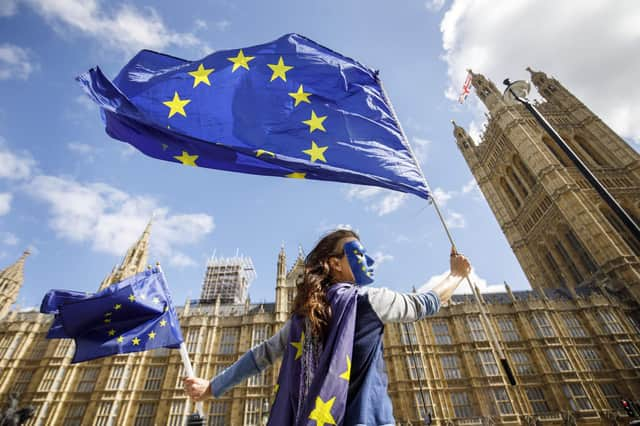Brexit's damage to UK economy makes case for greater co-operation with EU – John McLellan


I’m not one for re-writing history, but in the unlikely event that Britain remained outside all European multi-national institutions except the Council of Europe and faced the current financial repercussions of dealing with a pandemic, an energy crisis and global inflation, it’s a reasonable assumption that a deal which could increase national imports and exports by 15 per cent would be taken seriously.
It's maybe simplistic to argue a Britain outside of European trade blocs could increase trade to that extent by joining, but that’s the implication from consistent assessments from the Office for Budget Responsibility (OBR) that Brexit has resulted in a 15 per cent drop in UK imports and exports, most recently repeated in last week’s Economic and Fiscal Outlook (EFO) paper which accompanied Jeremy Hunt’s Autumn Statement. “The latest evidence suggests that Brexit has had a significant adverse impact on UK trade, via reducing both overall trade volumes and the number of trading relationships between UK and EU firms,” it reported. As sterling has lost 4.3 per cent of its value against the euro since the last EFO (says the OBR), the position might be worse.
Advertisement
Hide AdAdvertisement
Hide AdGiven how difficult any economic growth will be to achieve over the next two years ─ the OBR only predicts a return to GDP growth in late 2024 ─ something which would stimulate even half that activity with the EU would surely be worth considering? Indeed, which party serious about improving the UK economy would do anything else?
It’s against that background a Sunday Times report that "senior government figures” are planning closer ‘Swiss-style’ economic ties with the EU must be set, and although quickly denied by Downing Street and then fully rebutted yesterday by the Prime Minister at the CBI conference, the source appeared to be the Chancellor himself in an unattributable briefing with Sunday Times journalists.
Switzerland’s arrangement with the EU is based on a complex series of agreements, with regulatory alignment with the EU on trading standards and an EU budget contribution, both of which would be red lines for Brexit purists. There is also freedom of movement, but people moving to Switzerland must have a job or other means of support, which will be the basis of entry for most of the 205,000 immigrants the OBR expects to increase the UK population every year from 2026, and tallies with the view of Scottish Conservative leader Douglas Ross that immigration is needed to meet job shortages.
As members of the European Economic Area, Norway, Iceland and Lichtenstein are not signed up to the EU customs union or common trade policy, or agriculture and fisheries common policies, but otherwise allowing free movement of goods, people, services and capital would be deal-breakers for hard-line Brexiteers. But again, if the UK had never been an EU member and there hadn’t been a Brexit referendum, would such arrangements be seen as politically impossible?
Another government source, quoted in the Daily Telegraph, said they could not “jeopardise the full benefit of trade deals we are now able to strike around the world”, so the question is what exactly are those benefits which justify a 15 per cent slump? The OBR is scathing of their chances of making much difference.
“New trade deals with non-EU countries will not have a material impact, and any effect will be gradual,” it said in a paper updated in May. “This is because the deals concluded to date either replicate (or ‘roll over’) deals that the UK already benefited from as an EU member state, or do not have a material impact on our forecast”.
The recent UK-Japan agreement, said the OBR, would increase GDP by 0.1 per cent in the next 15 years. If that’s as good as it gets, then even if the Conservative Party is successful in burying internal debate for now ─ “Only a complete madman would suggest reopening this debate in the Conservative party at this time,” Brexiteer MP Liam Fox told the Telegraph ─ that doesn’t mean it will go away, and Jeremy Hunt’s view that trade barriers with the EU will come down in time begs the question when and under what conditions, Swiss or any other kind of style, which will pass muster with Brexit’s guardsmen?
A new YouGov poll shows support for Brexit at an all-time low, with 56 per cent of voters now believing it was wrong to leave, and only 32 per cent still in support, which might not be enough to persuade the Labour Party to take up the cudgels for another referendum, never mind a reversal, but the opportunity is opening up for a middle position which doesn’t reject a Swiss or Norwegian option out of hand, and would give a basis to claim there is a plan to help recoup the 15 per cent trade loss.
Advertisement
Hide AdAdvertisement
Hide AdHow attractive Labour’s plan to replace the House of Lords with an elected assembly remains to be seen ─ the promise of more elections and machine politicians won’t top everyone’s priorities ─ but the danger for Conservatives is at least 56 per cent won’t reject closer EU ties which could boost economic growth in a crisis.
In Scotland, the promise of closer EU relationship might be enough to queer an SNP pro-EU pitch it can’t deliver and persuade more Scottish pro-EU voters that Labour, not the SNP, presents a deliverable option.
A fortnight ago, it was reported that Irish Taoiseach Micheál Martin believed Rishi Sunak understood the need for “a way back to an agenda defined by growth and cooperation”. The OBR shows it can’t come soon enough.
Comments
Want to join the conversation? Please or to comment on this article.
